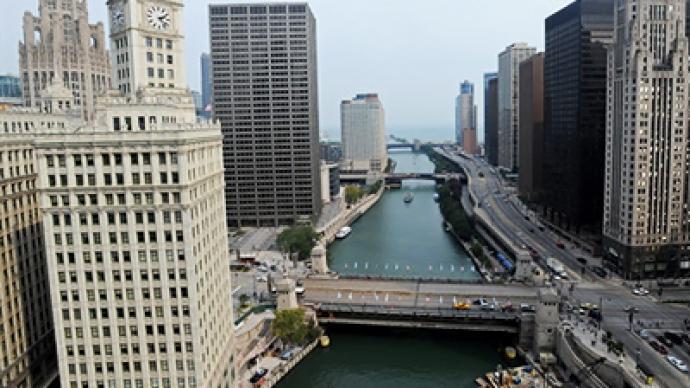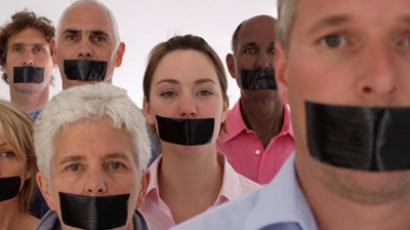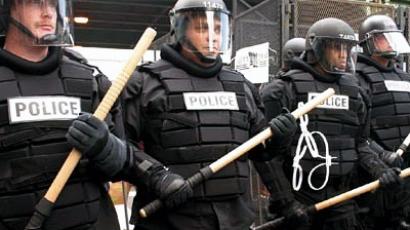Big Brother: Is the Red Squad back in Chicago?

Welcome to Chicago - the most “watched” city in the US. From old-school blue light cameras to cameras with state of the art technical capabilities – watchful lenses fill the streets.
In what has been dubbed Operation Virtual Shield, thousands of public and privately owned security cameras have been put in place and linked together, creating a capsule of surveillance over the entire city, more extensive than anywhere else in the United States.Chicago holds the record for number of surveillance cameras, estimated at up to 10,000. The network is said to have cost $60 million. Officials say it is worth the price, but privacy concerns are at a peak.Over twelve hundred security cameras located throughout the city are said to be powerful enough to zoom into a text of a book, or even a text message.A 37-page report from a renowned civil rights group – the ACLU – calls the network pervasive and unregulated.“Things on cameras have shown up on the Internet, cameras have been pointed and used in a particular way to ogle women, or to engage in some other intrusive activity”, said Ed Yohnka, American Civil Liberties Union of Illinois. To many, today’s watch over Chicago is reminiscent of a very dark chapter in its history when the Red Squad – special police units, spied on citizens. “The Red Squad kept files on hundreds of thousands of individuals and tens of thousands of organizations, in direct conflict with the first amendment of the US Constitution,” said Richard Gutman, former Attorney in a case against the Red Squad. From the 1920s to the 1970s – communists, civil rights groups, anti-war movements, and many more – were tracked. Jay Schaffner, a socialist, fell victim to the units back in the 1960’s.“I was spied on by the Red Squad as a high school student,” said the man who is now retired.Not much has changed, explained Schaffner, just the techniques are different.“In the 1960’s you used under-cover FBI agents, Red Squad agents that acted as agent provocateurs, or not – just spying on participants of legal political movements. Today, with the use of technology, you can do the same thing without the direct involvement of under-cover police operatives,” the socialist drew parallels. “We’ve become inured to this surveillance attitude that law enforcement has taken.”To journalist Salim Muwakkil, the concept of privacy in the US is long gone.He said Chicago increasingly resembles the chilling anti-utopia described in George Orwell’s legendary novel “1984” – where every word, action and even thought was monitored by ‘Big Brother’.“The only thing that’s missing are the microphones advising us on how to live our lives,” Muwakkil explained. While the stretch of surveillance grows, so do the fears of Americans.“It creeps me out, I don’t like it. When you fully appreciate the scale of what is being put in place in Chicago, and then imagine a more repressive city Government, a more oppressive regime, it could be incredibly intrusive,” said journalist Jamie Kalven. Chris Drew is an artist, arrested for selling one-dollar prints on the streets. He filmed his arrest. And now:“They want to charge me with class one felony, one step below attempted murder. And that’s up to fifteen years in a state prison! This is totally crazy,” said the artist. As the power of officials to record people’s movements expands, the power of the people to do the same is being squashed.“When we hook all these things up, and are able to follow people all around the city, and at the same time, they are telling us that we can’t even gather the information we need to go to court? Well, that represents a thorough and complete police state,” said Drew. Another worry has been a taboo on questioning surveillance methods. “Post 9/11, there has been orientation that anti-terrorist concerns trump any other value, so there is not even a discussion,” said journalist Jamie Kalven. This has left many wondering if the means designed to fight external terrors could end up terrorizing the people at home. “The notion that you occupy a city by police presence is as flawed, as it is globally, with the military presence. It’s not the problem, and it doesn’t address the problem, it doesn’t make us safer,” said Bernardine Dohrn, long-time activist and former leader of the Weather Underground organization. Caught in the camera's eye, Americans are beginning to question its real focus and to wonder how to shutter their privacy.Jacob Sullum, a senior editor at Reason Magazine explained that cameras of this nature are clearly invasive. “They can actually figure out where you’re going all day long and that reveals a lot about your personal life, even if it is all filleted on public property,” he said. The cameras can be intimately revealing about peoples’ daily lives as they track you anywhere and everywhere you go. In addition, it changes the way people act in public – it forces people to be inhibited negatively always worried about being watched, even if all they are doing it walking to the store.Governments often contend the cameras reduce crime rates, but studies indicate otherwise. Studies show there is little or no effect on the reduction in crimes and often the video footage is abused, with police officers reviewing footage to spy on attractive women. Some argued stricter control rules would prohibit abuse of the footage.“You don’t want to assume that the people in charge of these systems always have the best intentions,” he noted.













